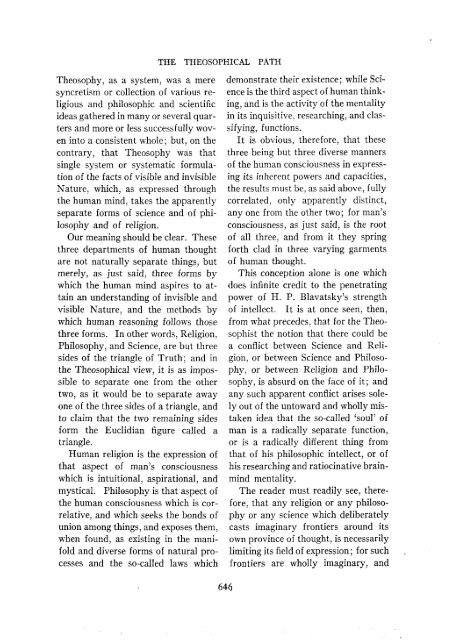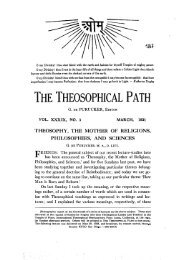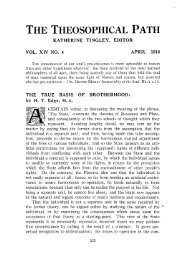theosophy, the mother of religions, philosophies, and sciences
theosophy, the mother of religions, philosophies, and sciences
theosophy, the mother of religions, philosophies, and sciences
Create successful ePaper yourself
Turn your PDF publications into a flip-book with our unique Google optimized e-Paper software.
THE THEOSOPHICAL PATH<br />
Theosophy, as a system, was a mere<br />
syncretism or collection <strong>of</strong> various re-<br />
ligious <strong>and</strong> philosophic <strong>and</strong> scientific<br />
ideas ga<strong>the</strong>red in many or several quar-<br />
ters <strong>and</strong> more or less successfully wov-<br />
en into a consistent whole; but, on <strong>the</strong><br />
contrary, that Theosophy was that<br />
single system or systematic formula-<br />
tion <strong>of</strong> <strong>the</strong> facts <strong>of</strong> visible <strong>and</strong> invisible<br />
Nature, which, as expressed through<br />
<strong>the</strong> human mind, takes <strong>the</strong> apparently<br />
separate forms <strong>of</strong> science <strong>and</strong> <strong>of</strong> phi-<br />
losophy <strong>and</strong> <strong>of</strong> religion.<br />
Our meaning should be clear. These<br />
three departments <strong>of</strong> human thought<br />
are not naturally separate things, but<br />
merely, as just said, three forms by<br />
which <strong>the</strong> human mind aspires to at-<br />
tain an underst<strong>and</strong>ing <strong>of</strong> invisible <strong>and</strong><br />
visible Nature, <strong>and</strong> <strong>the</strong> methods by<br />
which human reasoning follows those<br />
three forms. In o<strong>the</strong>r words, Religion,<br />
Philosophy, <strong>and</strong> Science, are but three<br />
sides <strong>of</strong> <strong>the</strong> triangle <strong>of</strong> Truth; <strong>and</strong> in<br />
<strong>the</strong> Theosophical view, it is as impos-<br />
sible to separate one from <strong>the</strong> o<strong>the</strong>r<br />
two, as it would be to separate away<br />
one <strong>of</strong> <strong>the</strong> three sides <strong>of</strong> a triangle, <strong>and</strong><br />
to claim that <strong>the</strong> two remaining sides<br />
form <strong>the</strong> Euclidian figure called a<br />
triangle.<br />
Human religion is <strong>the</strong> expression <strong>of</strong><br />
that aspect <strong>of</strong> man's consciousness<br />
which is intuitional, aspirational, <strong>and</strong><br />
mystical. Philosophy is that aspect <strong>of</strong><br />
<strong>the</strong> human consciousness which is cor-<br />
relative, <strong>and</strong> which seeks <strong>the</strong> bonds <strong>of</strong><br />
union among things, <strong>and</strong> exposes <strong>the</strong>m,<br />
when found, as existing in <strong>the</strong> mani-<br />
fold <strong>and</strong> diverse forms <strong>of</strong> natural pro-<br />
cesses <strong>and</strong> <strong>the</strong> so-called laws which<br />
demonstrate <strong>the</strong>ir existence; while Sci-<br />
ence is <strong>the</strong> third aspect <strong>of</strong> human think-<br />
ing, <strong>and</strong> is <strong>the</strong> activity <strong>of</strong> <strong>the</strong> mentality<br />
in its inquisitive, researching, <strong>and</strong> clas-<br />
sifying, functions.<br />
It is obvious, <strong>the</strong>refore, that <strong>the</strong>se<br />
three being but three diverse manners<br />
<strong>of</strong> <strong>the</strong> human consciousness in express-<br />
ing its inherent powers <strong>and</strong> capacities,<br />
<strong>the</strong> results must be, as said above, fully<br />
correlated, only apparently distinct,<br />
any one from <strong>the</strong> o<strong>the</strong>r two; for man's<br />
consciousness, as just said, is <strong>the</strong> root<br />
<strong>of</strong> all three, <strong>and</strong> from it <strong>the</strong>y spring<br />
forth clad in three varying garments<br />
<strong>of</strong> human thought.<br />
This conception alone is one which<br />
does infinite credit to <strong>the</strong> penetrating<br />
power <strong>of</strong> H. P. Blavatsky's strength<br />
<strong>of</strong> intellect. It is at once seen, <strong>the</strong>n,<br />
from what precedes, that for <strong>the</strong> Theo-<br />
sophist <strong>the</strong> notion that <strong>the</strong>re could be<br />
a conflict between Science <strong>and</strong> Reli-<br />
gion, or between Science <strong>and</strong> Philoso-<br />
phy, or between Religion <strong>and</strong> Philo-<br />
sophy, is absurd on <strong>the</strong> face <strong>of</strong> it; <strong>and</strong><br />
any such apparent conflict arises sole-<br />
ly out <strong>of</strong> <strong>the</strong> untoward <strong>and</strong> wholly mis-<br />
taken idea that <strong>the</strong> so-called 'soul' <strong>of</strong><br />
man is a radically separate function,<br />
or is a radically different thing from<br />
that <strong>of</strong> his philosophic intellect, or <strong>of</strong><br />
his researching <strong>and</strong> ratiocinative brain-<br />
mind mentality.<br />
The reader must readily see, <strong>the</strong>re-<br />
fore, that any religion or any philoso-<br />
phy or any science which deliberately<br />
casts imaginary frontiers around its<br />
own province <strong>of</strong> thought, is necessarily<br />
limiting its field <strong>of</strong> expression; for such .<br />
frontiers are wholly imaginary, <strong>and</strong>













